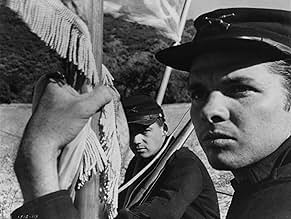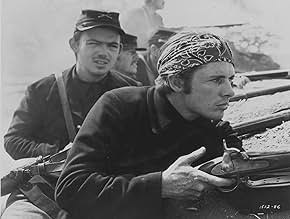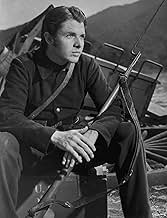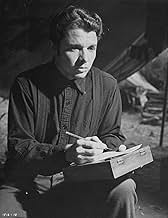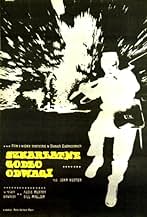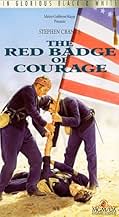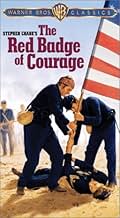VALUTAZIONE IMDb
7,1/10
5182
LA TUA VALUTAZIONE
Un adattamento troncato dell'omonimo romanzo di Stephen Crave su un soldato dell'Unione durante la Guerra Civile che fatica a trovare il coraggio per combattere nel cuore della battaglia.Un adattamento troncato dell'omonimo romanzo di Stephen Crave su un soldato dell'Unione durante la Guerra Civile che fatica a trovare il coraggio per combattere nel cuore della battaglia.Un adattamento troncato dell'omonimo romanzo di Stephen Crave su un soldato dell'Unione durante la Guerra Civile che fatica a trovare il coraggio per combattere nel cuore della battaglia.
- Regia
- Sceneggiatura
- Star
- Nominato ai 1 BAFTA Award
- 2 vittorie e 1 candidatura in totale
Robert Easton
- Thompson
- (as Robert Easton Burke)
Don Anderson
- Soldier
- (non citato nei titoli originali)
Smith Ballew
- Union Captain
- (non citato nei titoli originali)
Albert Band
- Union Soldier Fording River
- (non citato nei titoli originali)
Gregg Barton
- Soldier
- (non citato nei titoli originali)
Whit Bissell
- Wounded Officer
- (non citato nei titoli originali)
Robert Board
- Soldier
- (non citato nei titoli originali)
Chet Brandenburg
- Wounded Soldier
- (non citato nei titoli originali)
Edwin Breen
- Confederate Flag Bearer
- (non citato nei titoli originali)
Joe Brown Jr.
- Soldier
- (non citato nei titoli originali)
Recensioni in evidenza
Although John Huston's The Red Badge of Courage has stood the test of time critically, back then it lost lots of money in its first release. The film was a bone of contention between Louis B. Mayer and Dore Schary who were locked in a power struggle for control at Metro-Goldwyn- Mayer. Schary wanted to make the film, Mayer said it would flop and he was proved right. He also got ousted anyway.
The Red Badge of Courage refers to the blood that gets spilled should you sustain a battle wound. If you remember in Oliver Stone's Platoon, the men don't treat new arrival Charlie Sheen until he's gotten one of those. Here the Red Badge is something to be avoided if possible.
By a piece of serendipity when Audie Murphy returned from World War II and was deciding on a career, he chose the movies. He certainly was loaded down with offers, but I guess he sensed in himself an inner gift for being an actor. Not Marlon Brando or Laurence Olivier, but someone in the hands of the right director could get a good performance out of him. In John Huston he found that director, twice in fact as he later worked with him in The Unforgiven.
There was no need for research because our most decorated soldier in history lived the research in North Africa and Europe. There's a dimension to Audie's performance and that of GI cartoonist Willard Mullin that no training at the Actor's Studio could have given them. Murphy just summoned his memories of what it was like to be a kid from Texas whisked off to Europe the way young Henry Fleming is facing the Confederates in their backyard.
Murphy gets good support from an able cast of people like Arthur Hunnicutt, Royal Dano, John Dierkes, and Andy Devine as various other soldiers in the Union Army, all citizens serving their country. No career people in this crowd. Also James Whitmore, reading the narrative of Stephen Crane's novel serves almost like another cast member and moves the film's story line along.
Though it lost money for MGM, The Red Badge of Courage is still a fine film with some great insights into the meaning of battlefield bravery.
The Red Badge of Courage refers to the blood that gets spilled should you sustain a battle wound. If you remember in Oliver Stone's Platoon, the men don't treat new arrival Charlie Sheen until he's gotten one of those. Here the Red Badge is something to be avoided if possible.
By a piece of serendipity when Audie Murphy returned from World War II and was deciding on a career, he chose the movies. He certainly was loaded down with offers, but I guess he sensed in himself an inner gift for being an actor. Not Marlon Brando or Laurence Olivier, but someone in the hands of the right director could get a good performance out of him. In John Huston he found that director, twice in fact as he later worked with him in The Unforgiven.
There was no need for research because our most decorated soldier in history lived the research in North Africa and Europe. There's a dimension to Audie's performance and that of GI cartoonist Willard Mullin that no training at the Actor's Studio could have given them. Murphy just summoned his memories of what it was like to be a kid from Texas whisked off to Europe the way young Henry Fleming is facing the Confederates in their backyard.
Murphy gets good support from an able cast of people like Arthur Hunnicutt, Royal Dano, John Dierkes, and Andy Devine as various other soldiers in the Union Army, all citizens serving their country. No career people in this crowd. Also James Whitmore, reading the narrative of Stephen Crane's novel serves almost like another cast member and moves the film's story line along.
Though it lost money for MGM, The Red Badge of Courage is still a fine film with some great insights into the meaning of battlefield bravery.
Keep in mind that many people involved with this film were WW2 vets. That's important, as I think it made a HUGE difference in how the film came out. Audie Murphy was the most decorated American soldier of WW2. Bill Mauldin wasn't a line soldier, but he'd been in the infantry before the war. He knew what the daily life of a grunt was all about. And director John Huston had directed films in WW2, standing at the front lines in Italy to do so. They all knew what war should look like. Had these people not been involved, I think this movie wouldn't have rung true as it did then and does today. Sure, the weapons, most of the uniforms and equipment are horribly wrong (this was in the days when a "trapdoor" Springfield rifle and Indian War era equipment was just fine for a Civil War film), but this film must be viewed on it's acting and photography. They got it across what it was like to be SHOT at, and how it felt to be terrified in battle, better than any film since, "All Quiet of the Western Front." Yes, it's seriously abridged and condensed (quite a feat when you consider how short the book is), but it gets the spirit across just fine. It's not perfect by any measure, but you'll never be able to get such a group together to re-make this film and have ring as trued as this classic.
stephen crane's best work. audie murphy's best work. any serious student of the civil war will recognize this film as the best, most honest portrayal of civil war action. it captures the fear and dread of deadly combat like no other film on the american civil war. during bloody battles, if your side was not having a successful day, the usual way out was "skedaddling" or running like the wind. both sides did it. a great little film that all civil war students and scholars should own and view every so often.
This is really a very fine film and after seeing it on has to wonder why Audie Murphy never had more substantial roles in his career, as he was quite good in this film. As was mentioned in a previous post he was playing himself in the movie To Hell and Back and was essentially a B-Western actor the remainder of his career. This films shows that he was much more talented than one would ever know from watching the bulk of his films.
Deserves more credit than it currently receives. The directing alone is awesome, with the number of unique and different shots that Huston came up with really takes this Pic away from the norm.
Some of the realism in the portrayals that would be lost on some American viewers include the scene where the General talks to the troops before the battle, asking them what they are going to eat for dinner. He goes from group to group asking the same questions - why? Remember (duh), no radios, no public address system. Commanders had to spread their message by repeating it over and over - inspiring a different group each time.
A very enjoyable 69 minutes. Sad that the studio had to meddle with the original cut (what else is new?).
F
Some of the realism in the portrayals that would be lost on some American viewers include the scene where the General talks to the troops before the battle, asking them what they are going to eat for dinner. He goes from group to group asking the same questions - why? Remember (duh), no radios, no public address system. Commanders had to spread their message by repeating it over and over - inspiring a different group each time.
A very enjoyable 69 minutes. Sad that the studio had to meddle with the original cut (what else is new?).
F
Lo sapevi?
- QuizAfter seeing what MGM had done to the film, John Huston instructed his agent to include a clause in all future contracts guaranteeing that he would receive a copy of his director's cut on all of his films.
- BlooperBeginning at 14:28, several Union soldiers wading across the waist-deep river and later climbing out of the river are carrying the U.S. Rifle Model 1903, also known as the Springfield Model 1903. Note especially the soldier who climbs out of the river holding his rifle above his head. The Model 1903 is a bolt-action, magazine-fed rifle that was adopted by the US Army in 1903 and used in World Wars I and II, but not the American Civil War which was fought from 1861-1865.
- Citazioni
The General: Howdy Jim, Corporal. How are those wounds?
Soldier: Stinging some, General, but they're a-mending.
The General: That's fine, fine. Anybody care for a chaw?
- ConnessioniEdited into Hollywood: The Dream Factory (1972)
I più visti
Accedi per valutare e creare un elenco di titoli salvati per ottenere consigli personalizzati
- How long is The Red Badge of Courage?Powered by Alexa
Dettagli
Botteghino
- Budget
- 1.640.000 USD (previsto)
- Tempo di esecuzione
- 1h 9min(69 min)
- Colore
- Proporzioni
- 1.37 : 1
Contribuisci a questa pagina
Suggerisci una modifica o aggiungi i contenuti mancanti


